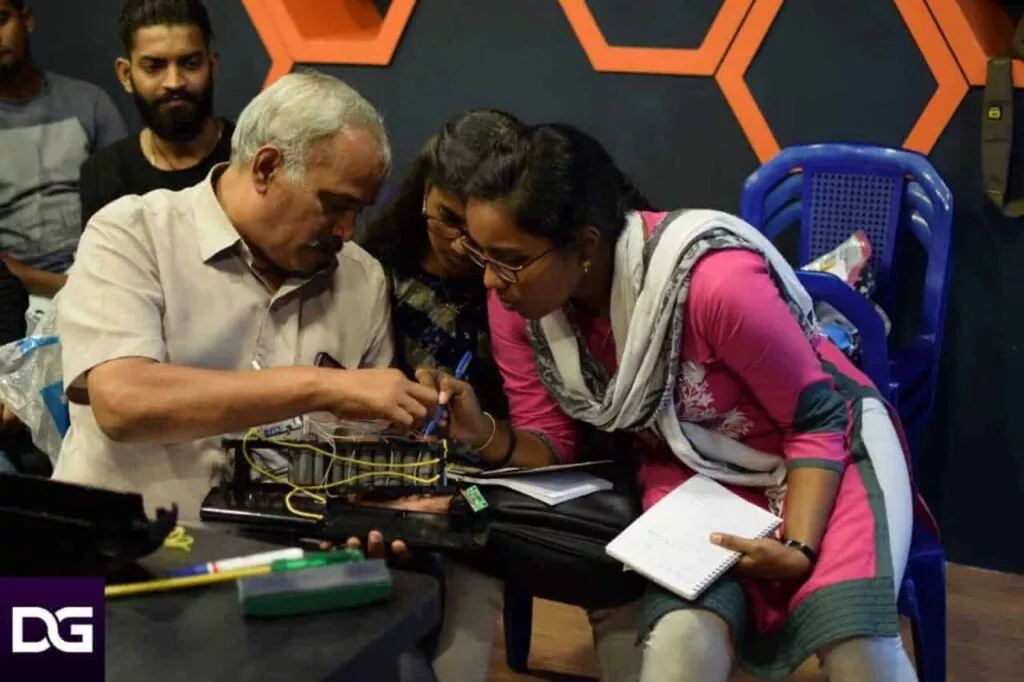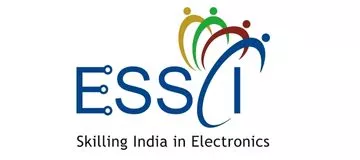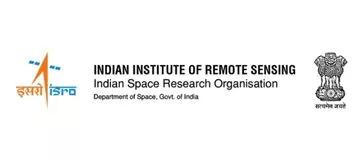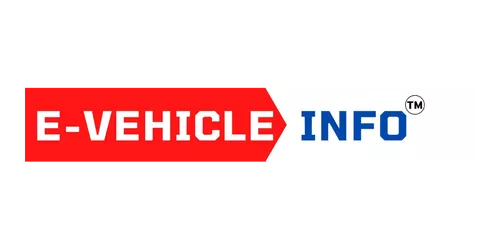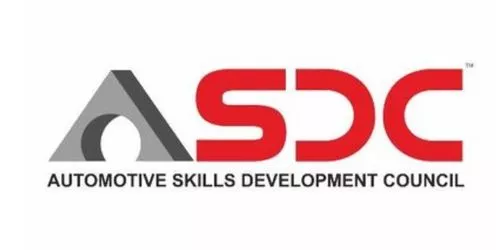

Electric Vehicle and Battery Technology Specialization Program
Designed specifically for Industries and technical professionals
Duration
3 Months / Specialization with 1 month software training
Format: LIVE + Online Self Paced + Doubt Sessions + Webinars + Projects
Last date to Apply
2nd week of each month with joining entrance test
Flexble
Monthly Batches with LIVE curriculum
Cover each aspect
with 60+ hours of recorded content and 25+ LIVE classes
Gain right knowledge
with 4+ projects and industrial case studies
Research based content
with training inspired from 25+ research papers and 50+ industry examples
Job Prospects
Designed with 5+ industrial trainers, inspired from 25 industrial portfolios across Asia & Europe
Career Advancement with EV
Transform your understanding of EV technology from foundational to expert level
Enroll now
Are You Ready to Accelerate Your Career with EV Expertise? Join the program with LIVE+self paced learning.
Who is this program for?
- Working professionals from an engineering background.
- Professional from techno-managerial field.
- Learners who are looking to transition into a career in EV industry and build very strong foundation in battery technology.
- B.E./B.Tech. students and fresh engineering graduates who want to launch their careers in the EV Industry.
Specialized roles one can apply for after doing this course
This program is tailored to help you improve your skills as a professional with the following expertise.
- Electrical Engineers
- Program Manager
- Team lead
- Powertrain Engineers
- Vehicle Engineers
- Vehicle Validation Engineer
- System Validation Engineers
- Technical Sales engineer
- Chief Engineers / Assistant Chief Engineer
- Assistant Engineers
- EV Dealership in charge
- Functional Engineer
- Performance Integration Engineers
- Automotive/Mechanical engineers
- EV Operators
- EV Entrepreneurs
- EV Technical Consultants
- Value Engineering Teams From OEMs
- EV Product Developer
- Cost Engineering Teams
- EV Research Scholar
The Industry Ready Curriculum: India’s most comprehensive Specialization program
Phase 1: Foundations of EV & Hybrid Vehicles
30 hours + 12+ sessions
Objective: The goal is to give the advanced understanding of electric vehicles through the basics and the representation of the essential components of EVs and hybrid vehicles. This stage covers the electric mobility basics, such as the principles, and also technology and environmental benefits.
Phase 2: EV Battery Technology and Powertrain Development
30 hours + 12+ sessions
Objective: To look at the details of EV battery systems and powertrain technologies – Battery Management Systems (BMS), advanced battery materials, and the interconnection and implementation of these components into efficient EV drives systems.
The curriculum is designed by the industry experts working in core engineering roles in EV and automobile companies.
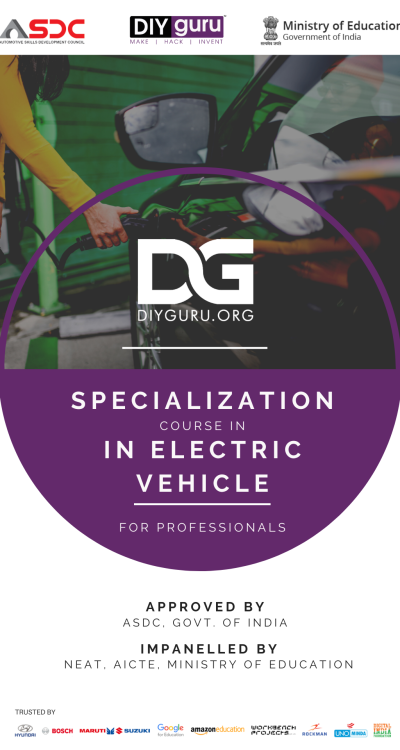
Module 1: Starting with EV Industry
Overview of Electric Vehicles (EVs)
- History and evolution of EVs
- Types and concepts of EVs and hybrid vehicles
Global and Indian EV Market
- Market trends, growth potential, and challenges
- Government initiatives and adoption policies
Sustainability and EVs
- EVs and their role in achieving UN Sustainable Goals
- Environmental benefits of electric mobility
Module 2: Starting with EV Industry
Automotive Industry Shifts
- Comparison of European, American, and Indian EV markets
- Transition challenges from ICE to EV technology
Key Components in ICE and EVs
- Differences in powertrain, fuel systems, and emissions between ICE vehicles and EVs
Technology Shift: ICE to Electric
- Engines to motors, fuel systems to batteries, exhaust to energy management
Module 3: EV Technology in Detail
Components and Layouts
- Detailed exploration of EV layouts, cables, components, and controls
Battery and Electric Motors
- Introduction to battery technology, electric motors, and battery management systems (BMS)
Charging Technology
- Overview of charging technology in EVs in detail
Module 4: Battery Technology for EVs
Battery Chemistry and Types
- Li-Ion battery chemistry, types, and comparisons
Battery Management Systems (BMS)
- BMS functionalities and its importance in EVs
Thermal Management
- Temperature control and monitoring in battery systems
Module 5: Power Electronics and Electric Motors
Power Electronics in EVs
- Basics, semiconductor devices, control techniques, and applications in EVs
Electric Motors for EVs
- Types of electric motors used in EVs and their industry use cases
Module 6: Advanced Battery Technologies and Materials
Innovations in Battery Materials
- Advances in energy density, durability, and safety of battery technologies
Recycling and Sustainability
- Battery recycling processes and sustainability considerations
Module 7: Battery Pack Design and Management
Design Fundamentals
- Configuration, thermal management, and structural considerations in battery pack design
Modeling and Simulation
- Use of simulation tools in designing and validating battery packs
Module 8: BMS Hardware and Software
BMS Hardware Development
- Components, design considerations, and integration with battery packsss
BMS Software Algorithms
- Development of algorithms for BMS, including battery health monitoring and data management
Module 9: EV Powertrain Components
Overview of EV Powertrain
- Key components, roles, and configurations
Efficiency and Optimization
- Techniques for optimizing powertrain efficiency and performance
Module 10: Emerging Technologies in EVs
Energy Management Systems
- Innovations in improving EV efficiency and battery life
Cutting-Edge Battery Solutions
- Exploration of new battery technologies and their integration into EVs
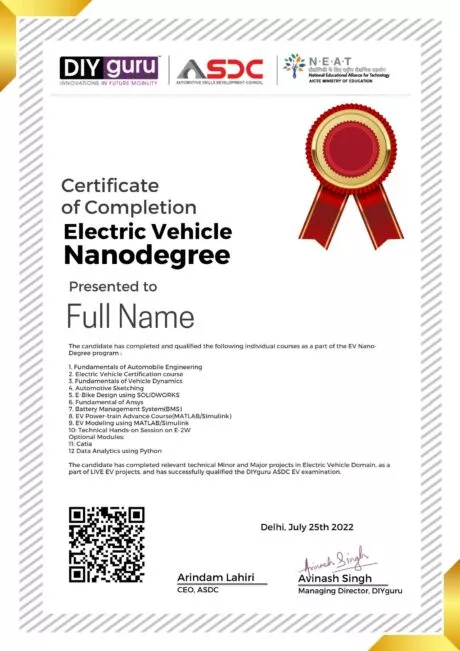
Sample certificate
Electric Vehicle Specialization Global Verified Certificate
Certified by ASDC, Automotive Skills Development Council & NEAT, AICTE, All India Council for Technical Education, Govt. of India
Learners love DIYguru
Here’s what some of our 40,000+ satisfied learners have to say about studying with DIYguru Team.

"Very informative course, high quality in terms of quizzes and assignments, liked the project at the end of the course. Oh, and great support. Can recommend this one to my friends and colleaugues. Being the very first player in EV industry, DIYguru has been crucial to the EV ecosystem development in india"

"I have known DIYguru since 2013 when the first version Autosports india was launched and in last 6-8 years the platform has emerged as the leading maker's learning platform in india. Form me the team behind DIYguru has been the best support all through the journey after Bachelors till my master's"

"Some of the best customer service I've ever seen. Great platform for mechanical and electrical engineers to learn EV!"

"This is truly a 5 star experience for youngsters in india! keen to learn about EV Technology"

"The platform has helped me personally to build my career in renewable energy in Canada. Hope to see DIYguru in Canada soon. Five stars!"

"liked the course with wide range of calculations in EV, all tutors are very supportive."

"Automotive design with incredible knowledgebase in terms of support from Baja Tutor community of DIYguru is wonderful experience. Documentation on the web is also good. "

"Amazing content and great support from DIYguru community"
Featured In - Media Spotlight
Awards and Recognitions
Frequently Asked Questions
Specialization and Individual Courses can be done online mode only. To attend offline class you need to enroll for either Nanodegree or PG Diploma program.
DIYguru centers are located in Delhi, Pune, Bangalore, Nepal, Bangladesh, Malaysia and Germany. To see the address, check Contact section of website.
Yes, all the individual courses, Nanodegree Programs, Specialization Programs and PG Programs are govt. approved.
NEAT (National Education Alliance for Technology) - AICTE, Ministry of Education, Govt. of India & ASDC, Automotive Skills Development Council.
Min. 12th pass can undergo this course. Students and Working Professionals with ITI, Diploma, BE / B.Tech or equivalent in domains such as Automotive, Mechanical, Electrical, Electronics can pursue this course.
Three Month, however in case you are unable to finish the course in three month, you can request for an extension here - Contact.
Two minor Project + One Major Project (Mandatory)
No. For Practical Hands on Training, you need to enroll for either Nanodegree or PG Diploma Program.
Yes, DIY KITs are available for this course, To avail it simply click on enroll button and it will shop you the option of purchasing course specific DIY KIT.
Admission fee for this course is 20000 INR / 250 USD
During checkout, you will get the option of paying in EMI
You will be given 6 month access to this course, to get lifetime access, you need to pay 10,000 INR / 120 USD.
Admission process for individual courses is direct online, there is no requirement of any screening test. However for Nanodegree and PG programs, you need to appear for test before taking admission.
You can avail project based internship for this course upon successfull completion.
Stepwise procedure for the course enrollment with a 4-week internship project
- Step 1: Apply for the internship-based learning-based course and fill the application form.
- Step 2: Pay the necessary fee to enroll in the program.
- Step 3: The technical team of DIYuru will check your entered data, and will share the confirmation of acceptance as you will be shortlisted in the next 24 hours.
- Step 4: Once you are enrolled in the course, start working on the course videos, and given assignments, and complete the course at your own learning pace! With this, you shall receive the ‘course completion’ certificate.
Project-based Internship process
- Step 5: If you have applied for the ‘internship-based learning’, then the team DIYguru Support shall connect with you to share the date of the ‘live course certification examination!’. This examination will enable you to understand your current expertise and will allow us to define the best possible project for you! Students will get a minimum of 4 weeks for the examination preparation.
- Step 6: Once you clear the examination, the DIYguru technical mentors will contact you to enroll you in the ‘live project’. Since students will work on a live project, students will get enough time to prepare themselves before the internship project begins.
- Step 7:
Since it is an ‘internship’ based project, the students will be encouraged to work through the assigned project in teams and will be allowed to achieve the results on their own, with mentorship support from DIYguru! Allowing you to gain the actual skills as an ‘intern’! Enrolled students will get a minimum of 4-6 weeks to work and submit their project reports.
- DIYguru shall also allow you to work in groups or as an individual. However, at the end of the internship, each student shall submit a project report with all the results achieved, for evaluation by the DIYguru technical team.
- Every candidate after successful completion of the internship project shall also submit a pitch presentation video, explaining his/her project-oriented achievements and results, so that the participants can work on their communication and presentational skills simultaneously. With this, you shall receive the ‘Project-based internship’ certificate (along with evaluation score), and an ‘achievement badge’ to validate that you have successfully cleared the ‘certification examination’ (shareable on LinkedIn and other platforms).
The internship after the completion of course is unpaid.
Placement assistance in terms of access to the Job portal will be provided, and you will be added to the weekly job update newsletter section to receive opportunities available in our partner companies.
Get in touch to learn more about how you can make the best of your talent
Spend less time worrying about job availability, and more time growing your knowledge. Join DIYguru Program today.
If you’re a current student, please get in touch through the DIYguru dashboard to ask about more details of this Program.
Please note, eligibility for this course is reserved to students who have done related projects and have relevant profiles matching with the pre-requisite of this course.
The DIYguru team hold the right to cancel your admisssion into the program without any explanation via email if found unsuitable and unfit.
Our 7-day money-back guarantee starts from the moment of signup and runs through the free week. Cancellations between days 7 and 30 will get a prorated refund.
Fees for the program is charged only when the admission is approved.


